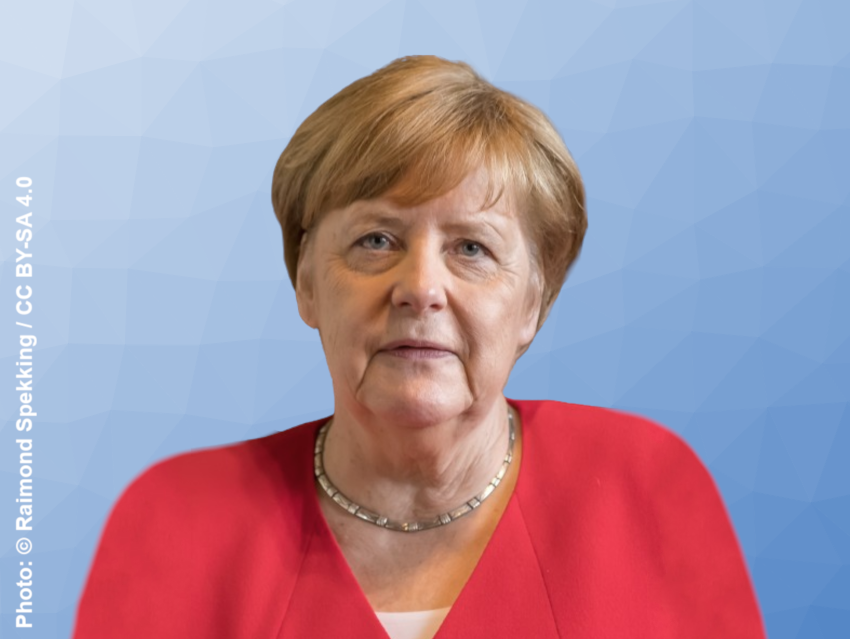Angela Merkel, Former Chancellor of Germany—and a quantum chemist by training—celebrates her 70th birthday today. She has had a remarkable career impacting both German and global politics. With her scientific background and pragmatic leadership, the Christian Democratic Union (CDU) member was a popular politician. Merkel was re-elected four times and served as Chancellor from 2005 to 2021.
Merkel was a trailblazer as the first female Chancellor, the first female leader of her party, the first female leader of the opposition in Germany, and the first Chancellor of reunified Germany who had been raised in the German Democratic Republic (GDR). Her legacy includes, for example, furthering the energy transition in Germany and the phase-out of nuclear power as well as strengthening political, military, and economic international relations in the EU and NATO. During her time in office, she handled a global recession, the European migrant crisis, and the start of the COVID-19 pandemic.
Angela Merkel was born Angela Kasner on July 17, 1954, in Hamburg, Germany, as the daughter of a protestant pastor. The family moved to Templin in East Germany, then the GDR, the same year. The socialist country was a secular society and Christian churches were the subject of repression by the state at times, as well as centers of resistance.
Merkel joined the Free German Youth (FDJ), the official communist youth movement, in 1968. While membership was technically voluntary, failing to take part could make it difficult to access, e.g., higher education. Merkel was a very good student, learned to speak fluent Russian, and graduated high school with the best possible grade. She went on to study physics at the Karl Marx University, Leipzig, Germany, from 1973 to 1978, and then moved to the Central Institute for Physical Chemistry of the Academy of Sciences in Berlin-Adlershof, Germany, in 1978. Merkel completed her Ph.D. with a thesis on quantum chemistry in 1986, worked as a researcher, and published several research articles. In 1989, the fall of the Berlin Wall served as a turning point in her life and career, and she transitioned from scientific work to politics.
Angela Merkel became involved in the growing democracy movement and joined the newly founded party “Demokratischer Aufbruch” (“Democratic Awakening”). She became press secretary of the party, which later merged with the CDU, in 1990. In the first federal election held after reunification in 1990, Merkel was elected to the Bundestag (the German parliament). She was appointed Minister for Women and Youth in the federal cabinet by Chancellor Helmut Kohl, often considered her mentor. From 1994 to 1998, she served as Minister for the Environment and Nuclear Safety.
In the federal election in 1998, Helmut Kohl was voted out and replaced as Chancellor by Gerhard Schröder, member of the Social Democratic Party of Germany (SPD). Merkel was appointed Secretary-General of the CDU in 1998, and became Chairperson of the party in 2000, making her the first female leader of a German party. She was the leader of the opposition in the German Bundestag from 2002 until 2005, when she was elected Chancellor, a position she held until 2021. She was often described as the “leader of the free world” after 2016, when the United States took less of a leading role in international cooperation. Merkel did not seek a fifth term in office and retired from politics. She is married to quantum chemist Joachim Sauer, Senior Researcher at Humboldt University, Berlin, Germany.
Selected Publications
- Temperature dependence of the Y hyperfine fields in YFe3,
A. Oppelt, A. Merkel, K. H. J. Buschow,
Phys. Status Solidi A 1976, 37, K205–K208.
https://doi.org/10.1002/pssa.2210370267 - On the influence of spatial correlations on the rate of chemical reactions in dense systems. II. Numerical results,
R. Der, R. Haberlandt, A. Merkel
Chem. Phys. 1980, 53, 437–442.
https://doi.org/10.1016/0301-0104(80)85132-9 - Berechnung von Hochdruck-Geschwindigkeitskonstanten für Zerfalls- und Rekombinationsreaktionen einfacher Kohlenwasserstoffmoleküle und -radikale,
A. Merkel, I. Börger, H.-J. Spugenberg, L. Zälicke
Z. Phys. Chem. 1982, 263, 449–460.
https://doi.org/10.1515/zpch-1982-26359 - Untersuchung des Mechanismus von Zerfallsreaktionen mit einfachem Bindungsbruch und Berechnung ihrer Geschwindigkeitskonstanten auf der Grundlage quantenchemischer und statistischer Methoden,
A. Merkel,
Doctoral dissertation, Central Institute for Physical Chemistry, Berlin, 1986. - Nonempirical parameter estimate for the statistical adiabatic theory of unimolecular fragmentation,
A. Merkel, L. Zülicke,
Mol. Phys. 1986, 60, 1379–1393.
https://doi.org/10.1080/00268978700100901 - Ab initio quantum chemical study of the SN2 reaction, CH3F+H− → CH4+F−, in the gas phase,
Z. Havlas, A. Merkel, J. Kalcher, R. Janoschek, R. Zahradník,
Chem. Phys. 1988, 127, 53–63.
https://doi.org/10.1016/0301-0104(88)87106-4 - Evaluation of the rate constant for the SN2 reaction CH3F + H− → CH4 + F− in the gas phase,
A. Merkel, Z. Havlas, R. Zahradnik,
J. Am. Chem. Soc. 1988, 110, 8355–8359.
https://doi.org/10.1021/ja00233a012



